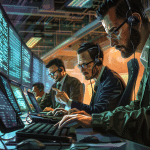Our cities are evolving faster than we can keep up, constantly shape-shifting to accommodate the dynamic demands of urban life. The urban planning and development process is becoming increasingly complex, influenced by a myriad of factors including population growth, economic shifts, and environmental conditions. In the midst of this complexity, advanced technology emerges as a strong ally, offering innovative solutions to shape our urban future. This article explores the role of technology in urban planning and discusses how digital tools and data are transforming cities into smart, sustainable urban environments.
The Era of Smart Cities
The term ‘smart city’ refers to an urban area that uses different types of electronic data collection sensors to supply information to manage resources and services efficiently. This information is used to improve the quality of life for its citizens, ensure sustainable development, and foster economic growth. In other words, a smart city uses technology to enhance the quality and performance of urban services, to reduce costs and resource consumption, and to engage more effectively with its citizens.
A lire en complément : Guide to successful online delicatessen shopping
The smart city concept is not just about the integration of technology into urban infrastructure but also about using this technology to address public concerns and to foster a citizen-centric approach to urban planning. The goal is to create smart cities that are not only technologically advanced but also socially inclusive and environmentally sustainable.
The Role of Data in Urban Planning
Data plays a critical role in the planning and development of cities. It provides city planners with the necessary information to make informed decisions about the future of cities. Data can provide insights into the needs and preferences of the city’s residents, helping planners design urban spaces that are tailored to the specific needs of the community.
A découvrir également : How Are AI Algorithms Improving Energy Management in Smart Grids?
With the advent of big data, the amount of information available to urban planners has grown exponentially. Big data refers to large data sets that are so complex that traditional data-processing software can’t handle them. This data, combined with advanced analytics techniques, can provide unprecedented insights into urban systems, helping planners to make more informed decisions.
Technological Solutions for Sustainable Development
As urban populations continue to grow, sustainable development is becoming increasingly important. Technology can offer innovative solutions to promote sustainability in urban environments. From smart grids that optimize energy consumption to waste management systems that use sensor technology to track and manage waste, technology can play a crucial role in promoting sustainable practices in urban environments.
Moreover, technology can also play a crucial role in promoting green infrastructure. For instance, digital mapping tools can help planners identify areas that are suitable for green spaces or renewable energy installations. Similarly, IoT-enabled sensors can monitor environmental conditions in real-time, helping to create more environmentally friendly urban environments.
Enhancing Public Services through Technology
Technology can also enhance the delivery of public services in cities. From transportation to healthcare, technology can make public services more efficient, responsive, and user-friendly.
For example, digital platforms can provide real-time information about public transportation, helping commuters plan their journeys more efficiently. Similarly, telemedicine technologies can enable remote healthcare services, making healthcare more accessible to urban residents.
Furthermore, technology can also help to improve public safety. From surveillance systems that use AI to detect unusual activities to emergency response systems that use data to optimize response times, technology can make cities safer.
The Future of Urban Planning: Digital Connectivity
In the future, the role of technology in urban planning is set to increase. As we move towards a digital economy, connectivity will become even more important. The digital infrastructure of a city will play a key role in determining its economic competitiveness and its ability to provide high-quality services to its residents.
The future of urban planning lies in the ability to leverage technology to create connected, inclusive, and sustainable cities. As city planners continue to grapple with the challenges of urbanization, technology offers a powerful tool to help them shape the cities of the future. The extent to which they can harness this tool will determine the future of our urban landscapes.
In the end, what really matters is not the technology itself, but how we use it. Technology is not a magic bullet that can solve all urban problems, but it can certainly be a powerful tool in our effort to create better, more livable cities.
Space Technology in Urban Planning
Space technology, particularly the use of satellite imagery and geospatial data, is revolutionizing the field of urban planning. This technology provides crucial insights into various aspects of urban life, including population density, land usage, transportation patterns, and environmental conditions. This data can be utilized by urban planners to make informed decisions and develop strategies that enhance the quality of life in urban areas.
Satellite imagery, for instance, allows planners to monitor urban expansion and land use changes over time. This information can be used to predict future trends and to formulate effective urban development strategies. Similarly, geospatial data can provide detailed information about the physical characteristics of urban areas, helping planners to design urban spaces that are more responsive to the specific needs of the community.
Moreover, the use of space technology can also facilitate more participatory approaches to urban planning. By making geospatial data accessible to the public, urban planners can enable citizens to contribute to the decision-making process, promoting a more democratic and inclusive approach to urban development.
Artificial Intelligence (AI) and Urban Planning
Artificial Intelligence (AI) is another advanced technology that is having a significant impact on urban planning. AI can analyze large volumes of data quickly and accurately, helping urban planners to make more informed decisions.
For example, AI can be used to analyze traffic data in real time, enabling planners to identify bottlenecks and to develop strategies to improve the efficiency of transportation systems. Similarly, AI can be used to forecast future trends, helping planners to anticipate changes in population, housing demand, and job growth, among other factors.
Furthermore, AI can also be used to model and simulate different scenarios, allowing planners to assess the potential impacts of their decisions before they are implemented. This can lead to better decision-making and more effective urban planning strategies.
Conclusion and Key Takeaways
In conclusion, advanced technology is playing an increasingly crucial role in urban planning and development. From the use of big data and AI for decision-making, to the adoption of IoT and space technology for monitoring and managing urban environments, technology is transforming the way we plan and develop our cities.
Key takeaway points include the fact that smart cities leverage advanced technology to enhance the quality of urban living, promote sustainable development, and foster economic growth. Data-driven decision-making, enabled by big data analytics and AI, is crucial for effective urban planning. Also, the use of space technology and the Internet of Things (IoT) provides real-time insights into urban environments, enabling more responsive and effective city initiatives.
As we move into the future, the role of technology in urban planning is likely to continue to grow. However, it is crucial to remember that technology is simply a tool. The success of urban planning will be determined not only by our ability to develop and use advanced technologies but also by our commitment to creating cities that are inclusive, sustainable, and people-centered.











